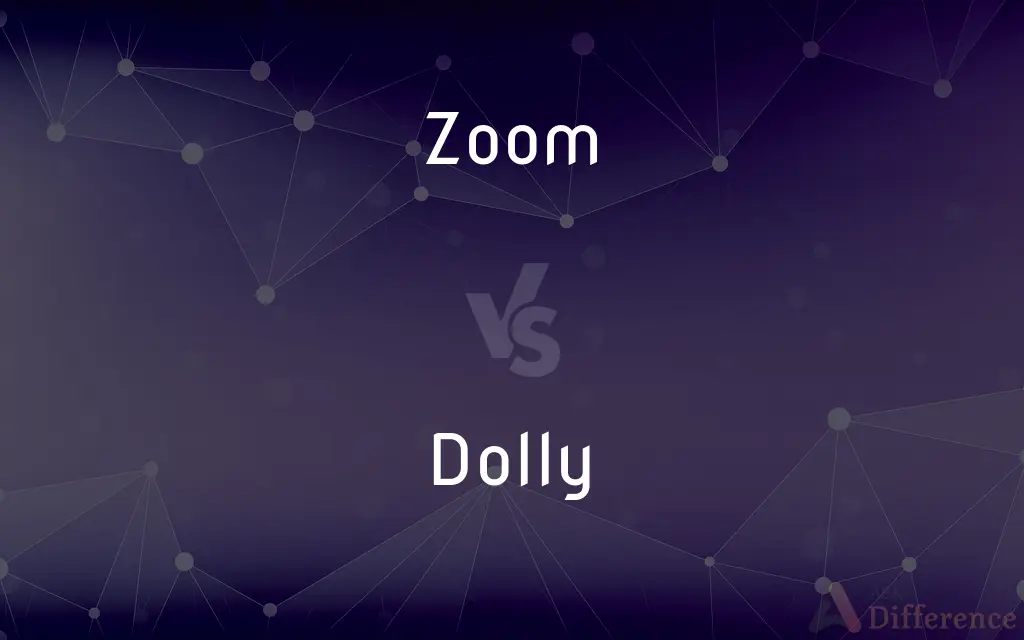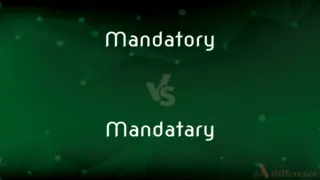Zoom vs. Dolly — What's the Difference?
By Maham Liaqat & Urooj Arif — Updated on May 14, 2024
Zoom alters the viewer's perception by magnifying the image with a lens, while a dolly involves physically moving the camera closer or further from the subject.

Difference Between Zoom and Dolly
Table of Contents
ADVERTISEMENT
Key Differences
Zooming changes the focal length of the camera lens to bring the subject closer or push it away visually, whereas dollies require the entire camera to move towards or away from the subject, altering the perspective and depth.
The zoom is achieved through camera settings, allowing for quick adjustments without displacing the camera, while dolly movements are physical, often requiring tracks and can affect the shot's depth of field and spatial relationships.
A zoom can compress or expand a scene's depth depending on how it's used, making background objects appear closer to or further from the foreground, on the other hand, a dolly physically changes the camera's position, which can introduce or reduce parallax effects in the visual composition.
Zooming is often used for quick close-ups or to adjust the frame during a shot without interrupting the shooting process, whereas dolly shots are planned for dramatic effect, providing a sense of motion and changing the viewer's relationship with the scene.
While zoom adjustments are typically quicker and can be done even with static camera setups, dolly movements require more preparation and physical space to execute but offer a more cinematic quality by changing the viewer's perspective through actual movement.
ADVERTISEMENT
Comparison Chart
Definition
Altering the camera's focal length
Physically moving the camera
Main Use
Magnify or reduce the perceived size
Change the camera's position
Impact on Image
Can compress or expand scene depth
Alters perspective and depth
Movement
Internal camera mechanism
External, involves camera displacement
Cinematic Effect
Quick focus changes, depth alteration
Real movement, enhances spatial feeling
Compare with Definitions
Zoom
To change the focal length of a camera lens to make the subject appear closer or further.
He zoomed in to capture the bird's intricate feathers.
Dolly
A camera movement that involves physically moving the camera forwards or backwards.
The dolly shot moved through the hallway, building suspense.
Zoom
Adjusting the lens to modify how large subjects appear.
Zoom out to show the entire crowd at the concert.
Dolly
Using camera movement to add a sense of three-dimensional space.
The dolly shot made the audience feel like they were walking alongside the character.
Zoom
The act of magnifying part of a scene in photography or film.
A slow zoom can dramatically alter a scene's focus.
Dolly
(Informal) A child's doll.
Zoom
A camera technique that alters the magnification of the image.
The director used a zoom to emphasize the actor's reaction.
Dolly
A low mobile platform that rolls on casters, used for transporting heavy loads.
Zoom
Technique used to focus on details or widen the view.
Use the zoom feature to highlight the texture of the painting.
Dolly
Such a platform as used by one working underneath a motor vehicle.
Zoom
To make a continuous low-pitched buzzing or humming sound
I heard a plane zooming overhead.
Dolly
A hand truck.
Zoom
To move while making such a sound
Couldn't hear as the motorcycle zoomed past.
Dolly
A wheeled apparatus used to transport a movie camera steadily along the ground or along a track.
Zoom
To move rapidly
Comets that zoom through space.
Dolly
A movie shot made by a camera moving steadily on a dolly; a tracking shot.
Zoom
To increase suddenly and dramatically
Stock prices zoomed in early trading.
Dolly
A small locomotive, as for use in a railroad yard or on a construction site.
Zoom
To act or proceed swiftly and energetically
Zoomed through the novel in a day.
Dolly
A wooden implement for stirring clothes in a washtub.
Zoom
To simulate movement rapidly away from or toward a subject using a zoom lens or other optical device.
Dolly
A tool used to hold one end of a rivet while the opposite end is being hammered to form a head.
Zoom
(Computers) To cause text or other graphics in a window or frame to appear larger on the screen.
Dolly
A small piece of wood or metal placed on the head of a pile to prevent damage to the pile while it is being driven.
Zoom
To cause to zoom.
Dolly
To move a dolly in a specified direction
The camera dollied left, keeping the actors in the frame.
Zoom
The act or sound of zooming.
Dolly
A doll.
Zoom
A zoom lens.
Dolly
(cooking) A roughly cylindrical wooden object used as a base when molding pie crust.
Zoom
A humming noise from something moving very fast.
The zoom of traffic
Dolly
A contrivance for stirring:
Zoom
(figurative) A quick ascent.
Dolly
A disc with downward legs and a vertical handle, used for agitating laundry.
Zoom
(figurative) A big increase.
Dolly
A device turned on a vertical axis by a handle or a winch, giving a circular motion to ore being washed.
Zoom
An augmentation of a view, by varying the focal length of a lens, or digitally.
What's the zoom like on your camera?
Dolly
A tool with an indented head for shaping the head of a rivet.
Zoom
A video teleconferencing call.
Dolly
In pile driving, a block interposed between the head of the pile and the ram of the driver.
Zoom
To move fast with a humming noise.
We zoomed along the highway.
Dolly
A small truck with a single wide roller used for moving heavy beams, columns, etc., in bridge building.
Zoom
(aviation) To zoom climb.
Dolly
A small truck without means of steering, to be slipped under a load.
Zoom
To move rapidly.
Dolly
A compact, narrow-gauge locomotive used for moving construction trains, switching, etc.
Zoom
To go up sharply.
Prices zoomed
Dolly
(film) A specialized piece of film equipment resembling a little cart on which a camera is mounted.
Zoom
(photography) To change the focal length of a zoom lens.
Dolly
A fashionable young woman, one who follows the latest music or clothing fashions.
Zoom
To manipulate a display so as to magnify or shrink it.
To zoom in or zoom out
Dolly
A ball hit by a batsman such that it goes gently to a fielder for a simple catch.
Zoom
To participate in a video teleconferencing call.
Dolly
(gambling) A marker placed on the winning number by the dealer at roulette.
Zoom
Representing a humming sound
Dolly
(India) An offering of fruit or flowers.
Zoom
Suggesting something moving quickly
Dolly
To hit a dolly.
Zoom
Suggesting a sudden change, especially an improvement or an increase
Dolly
(transitive) To move (an object) using a dolly.
Zoom
A rapid rise
Dolly
(transitive) To wash (laundry) in a tub using the stirring device called a dolly.
Zoom
The act of rising upward into the air
Dolly
(transitive) To beat (red-hot metal) with a hammer.
Zoom
Move along very quickly
Dolly
(transitive) To crush ore with a dolly.
Zoom
Move with a low humming noise
Dolly
(Polari) Pretty; attractive.
Zoom
Rise rapidly;
The dollar soared against the yes
Dolly
Left-handed (also dolly-handed, dolly-pawed, dolly-posh){{cite book
Dolly
A contrivance, turning on a vertical axis by a handle or winch, and giving a circular motion to the ore to be washed; a stirrer.
Dolly
A tool with an indented head for shaping the head of a rivet.
Dolly
In pile driving, a block interposed between the head of the pile and the ram of the driver.
Dolly
A small truck with a single wide roller used for moving heavy beams, columns, etc., in bridge building.
Dolly
A compact, narrow-gauge locomotive used for moving construction trains, switching, etc.
Dolly
A child's mane for a doll.
Dolly
Conveyance consisting of a wheeled support on which a camera can be mounted
Dolly
Conveyance consisting of a wheeled platform for moving heavy objects
Dolly
A small replica of a person; used as a toy
Dolly
Moving the entire camera setup on a track or wheels.
They set up a dolly to capture the smooth walking scene.
Dolly
Technique used to change perspective by moving the camera.
A dolly out reveals more of the scene's context.
Dolly
The physical relocation of a camera to enhance depth.
Dolly in slowly to intensify the viewer's focus on the character.
Common Curiosities
Are dolly shots common in all types of films?
Dolly shots are common in feature films and are used for their dramatic effect but are less common in faster, guerrilla-style filmmaking due to the equipment required.
What does it mean to dolly a camera?
To dolly a camera means to move the camera physically closer to or further from the subject.
What is a zoom in film?
Zoom refers to changing the camera's focal length to alter how close or distant the subject appears.
What are the benefits of using zoom over dolly?
Zoom allows for quick changes in frame size without the need for physical space or additional equipment.
Is special equipment required for dolly shots?
Yes, dolly shots typically require tracks or wheeled carts to move the camera smoothly.
Can zoom replace dolly movements?
While zoom can adjust the perceived distance to the subject, it cannot replicate the depth and perspective changes achieved with a dolly.
What types of scenes benefit most from dolly shots?
Scenes that aim to enhance emotional depth or provide a dynamic perspective benefit most from dolly shots.
Can zoom be done digitally as well as optically?
Yes, zoom can be achieved both optically, with the camera lens, and digitally, through post-production effects.
What is the main drawback of using a dolly?
The main drawback of using a dolly is the need for space and equipment, which can be impractical in tight locations.
Do dollies only move in straight lines?
While traditional dolly shots move straight, modern dolly setups can also move laterally or on curved tracks.
Is there a difference between a dolly and a tracking shot?
Dolly shots specifically involve moving the camera along tracks to follow the subject, while tracking shots can include any type of camera movement following an action.
How does dolly movement affect a film's narrative?
Dolly movements can enhance narrative by physically bringing the audience closer to or further from the action, influencing emotional engagement.
Can zooming be noticed by viewers?
Yes, viewers can often notice zooming, especially if it's rapid, as it changes the framing and focus of the scene.
How should filmmakers decide between using a zoom or a dolly?
The decision depends on the desired visual effect, practical limitations, and the narrative needs of the scene.
How does zoom affect the depth of field?
Zooming can alter the depth of field by making backgrounds appear closer to the foreground when zooming in.
Share Your Discovery

Previous Comparison
Mandatory vs. Mandatary
Next Comparison
Cyclohexane vs. BenzeneAuthor Spotlight
Written by
Maham LiaqatCo-written by
Urooj ArifUrooj is a skilled content writer at Ask Difference, known for her exceptional ability to simplify complex topics into engaging and informative content. With a passion for research and a flair for clear, concise writing, she consistently delivers articles that resonate with our diverse audience.
















































